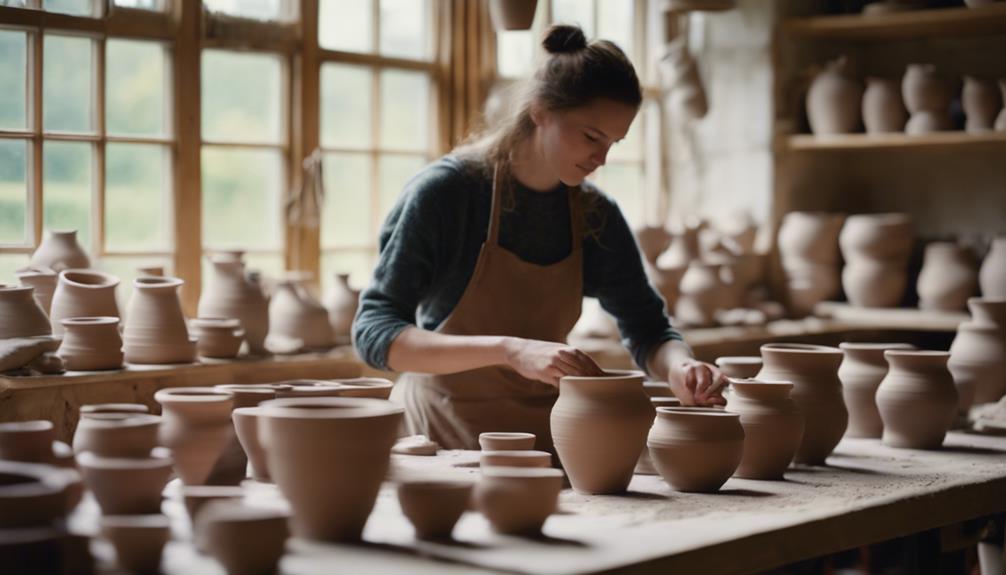Top Tips for Pottery Classes in Shropshire
When selecting pottery classes in Shropshire, take into account your skill level to ensure you choose the appropriate class. Essential tools include aprons, sponges, and high-quality brushes for effective practice. Explore techniques such as hand building and wheel throwing to expand your skills. Remember to seek instructor feedback for tailored guidance, which will help you progress faster. Regular practice and clear objectives will help you stay motivated. For local studios, consider places like Doodle Alley in Ellesmere and Wenlock Pottery in Much Wenlock for enjoyable experiences. By engaging with these aspects consistently, you'll discover more valuable insights to enhance your pottery journey.
Key Points
- Select a class with a skilled instructor for tailored guidance.
- Regularly attend classes to guarantee ongoing skill development.
- Utilise high-quality tools and materials to enhance your pottery results.
- Seek feedback from your instructor regularly to speed up your progress.
- Engage in local events and workshops to enrich your learning experience.
Selecting the Right Class
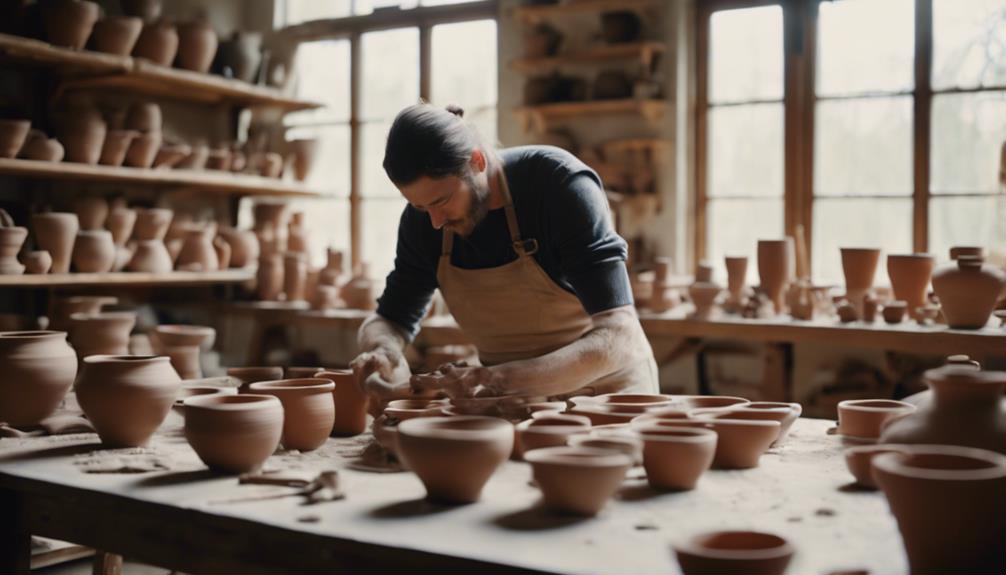
Choosing the right pottery class in Shropshire means considering your skill level and what you want to learn. You'll find classes tailored to various skill levels, from beginners to advanced potters. Start by assessing your own skills. Are you just starting out, or do you have some experience? This self-assessment will help you choose a class that matches your abilities.
Next, look at the class schedule to make sure it fits your availability. Consistency is key to learning pottery, so find a class that you can commit to regularly. Instructor expertise is another essential factor. A knowledgeable instructor can provide personalised guidance, helping you develop your skills more effectively. Their experience in pottery can make a significant difference in your learning curve.
Check if the class offers personalised guidance tailored to your skill level. Classes that assess your abilities and adjust their teaching accordingly can provide a more enriching experience. This approach ensures you're neither overwhelmed nor bored, making the learning process enjoyable.
Essential Tools and Materials
To get started in pottery classes in Shropshire, you'll need some basic tools like an apron, notebook, watercolour brushes, clingfilm, sponge, and a paint scraper.
Understanding different clay types is essential, as each has unique properties and uses.
Additionally, glazing is an important aspect of pottery, so knowing what tools and materials to use will help you achieve beautiful, finished pieces.
Basic Pottery Tools
When starting pottery, you'll need a set of essential tools like an apron, notebook, watercolour brushes, clingfilm, sponge, and paint scraper. Your notebook organisation is essential as it'll help you keep track of your projects and any techniques you learn along the way.
For brush selection, watercolour brushes are versatile and great for various decorating techniques. Don't hesitate to invest in quality brushes, as they'll make a significant difference in your designs.
An apron is a must to protect your clothes from clay and glazes. Clingfilm is handy for keeping your clay moist between sessions. Sponges are essential for smoothing surfaces and cleaning up small mistakes. A paint scraper can be used for both shaping and detailing your work.
As you progress, you might want to get a cutting wire and additional shaping tools. Specialty brushes like Chinese or Japanese brushes can help with intricate designs, giving your pottery a unique touch. Always consult with your instructor before purchasing pottery colours to make sure they're compatible with your project.
With the right tools, you'll find that the pottery-making process becomes more enjoyable and your results improve significantly. Happy potting!
Clay Types Explained
In pottery classes, understanding the different types of clay—such as earthenware, stoneware, and porcelain—will help you choose the best material for your projects. Each clay type has unique characteristics and firing temperatures, influencing the final appearance and durability of your work.
Earthenware, for instance, fires at lower temperatures and is more porous, making it ideal for decorative pieces. Stoneware, with its higher firing temperature, offers strength and durability, perfect for functional items like mugs and plates. Porcelain, known for its fine texture and high firing temperature, is excellent for delicate and intricate designs.
When selecting your clay type, consider colour compatibility with the glazes you'll use. Different clays react differently to glazes, so it's important to make sure your chosen colours will complement your clay's properties. Your instructors can provide valuable insights into which combinations work best.
Essential tools and materials, like aprons, watercolour brushes, and cutting wire, can significantly impact your pottery experience. These tools not only improve your craftsmanship but also help you navigate the unique characteristics of each clay type effectively.
Embrace the learning process and connect with your fellow potters, as sharing tips and experiences fosters a sense of belonging in the pottery community.
Glazing Essentials
Mastering the art of glazing can elevate your pottery pieces from good to exceptional, and having the right tools and materials is essential. In your Shropshire pottery classes, you'll find essential tools like watercolour brushes, paint scrapers, sponges, and masking tape indispensable for achieving those perfect finishes. Don't forget aprons and notebooks to keep things tidy and organised, along with clingfilm to preserve your glazes.
For those venturing into advanced glazing techniques, specialised tools such as cutting wire and Chinese or Japanese brushes can provide that extra finesse. These tools help you apply intricate details and unique textures that can set your work apart.
Before you immerse yourself in the world of glaze colours, consider a glaze colour consultation. The benefits of consulting include avoiding costly mistakes and ensuring the colours you choose match your creative vision. It's a small step that can lead to big rewards in your finished pieces.
Quality tools are vital. They not only make the glazing process smoother but also improve the final look of your pottery. Investing in the right materials and tools helps you feel more connected and confident in your pottery community.
Methods to Explore
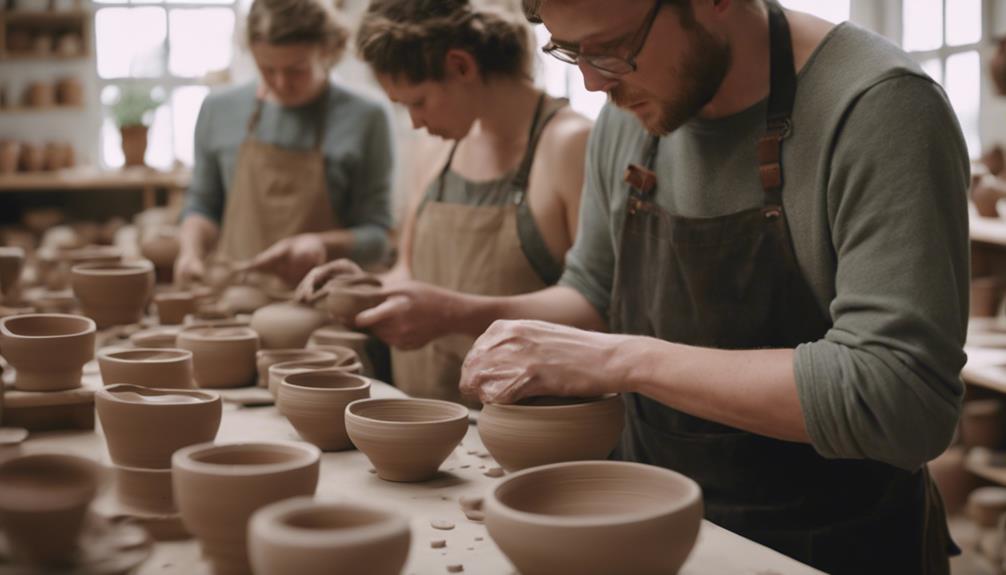
Explore the artistry of pottery by delving into hand building techniques like coiling, pinching, and slab construction. These methods allow you to shape clay into unique forms, giving your creations a personal touch.
Once you're comfortable with these basics, you can start experimenting with wheel throwing. This technique is perfect if you're aiming for symmetrical, intricate pottery pieces.
To enhance your work further, try incorporating advanced decoration methods. Techniques such as sgraffito, inlay, and slip trailing can add depth and character to your pieces.
For those interested in the technical side, understanding kiln firing processes is essential. Different temperatures and atmospheres can dramatically affect the final look and durability of your pottery.
In Shropshire, you'll find a variety of pottery styles, from traditional to contemporary. This diversity allows you to explore different artistic directions and find what resonates with you.
Here are some key techniques to explore:
- Hand building: coiling, pinching, slab construction
- Wheel throwing for symmetrical pieces
- Advanced decoration: sgraffito, inlay, slip trailing
- Understanding kiln firing
- Exploring traditional and contemporary styles
Seeking Instructor Feedback
Seeking feedback from your instructors is essential for your growth in pottery classes. They can offer constructive criticism, which helps you understand your strengths and areas that need improvement.
Constructive Criticism Benefits
Receiving feedback from your pottery tutor can greatly accelerate your skill development and artistic growth. Embracing constructive criticism not only demonstrates appreciation for feedback but also lays the groundwork for skill improvement. With a growth mindset, you can thrive in a supportive environment where guidance from your tutor helps you refine your techniques and enhance your creations.
Some key benefits of seeking tutor feedback include:
- Clarity on Improvement Areas: Understanding specific aspects of your work that need refinement can lead to more focused practice.
- Technique Refinement: Tutors can provide insights on how to improve your hand movements, shaping techniques, and finishing touches.
- Boosted Confidence: Constructive criticism, when given in a supportive manner, can help you feel more confident in your abilities.
- Enhanced Creativity: Feedback can inspire new ideas and approaches, encouraging you to experiment and innovate.
- Faster Progress: Regular feedback ensures you are continually learning and evolving, leading to quicker mastery.
Progress Tracking Methods
Your pottery journey can greatly benefit from regularly seeking feedback from your instructor to track your progress effectively. Instructors provide valuable insights into your technique and identify areas needing improvement. This feedback is essential for skill assessments and setting achievable goals, ensuring you continually progress and refine your craft.
One effective method to track your progress is through progress journaling. Documenting your experiences, challenges, and milestones helps you visualise your growth over time. Coupling this with regular instructor feedback creates a comprehensive view of your development.
Additionally, peer evaluations can offer a different perspective, giving you a well-rounded understanding of your skills and areas for growth.
Skill assessments conducted by your instructor can pinpoint specific techniques or practices that need attention. These assessments are instrumental in goal setting, helping you focus on incremental improvements. By setting clear, attainable goals based on instructor feedback, you stay motivated and engaged in your pottery classes.
Regular feedback sessions with your instructor tailor your learning experience to your unique needs and skill level. This personalised approach fosters a sense of belonging within the pottery community in Shropshire, enhancing your overall learning experience and keeping you committed to your pottery journey.
Practice Makes Perfect
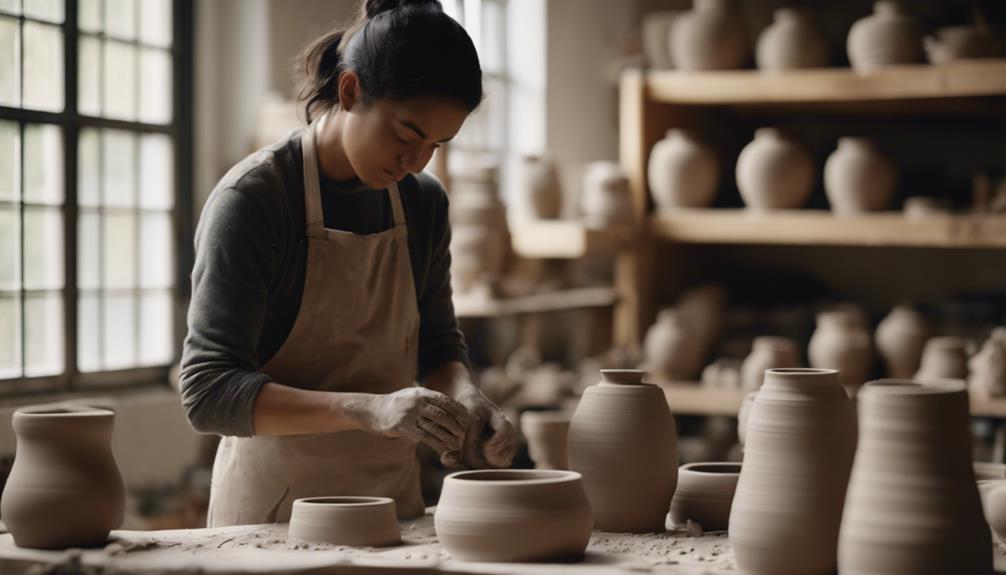
Regular practice in pottery classes sharpens your skills and hones your techniques over time. By consistently attending classes, you'll gain hands-on experience and learn from your mistakes, leading to significant skill development. This ongoing effort will help you build muscle memory, making each movement more intuitive and less forced, ultimately guiding you towards mastery.
To make the most of your practice sessions:
- Attend classes consistently: Regular attendance guarantees you're continually growing and improving.
- Repeat tasks: Repetition helps you get comfortable with various techniques, reinforcing your muscle memory.
- Experiment and create: Don't be afraid to try new things. This will boost your creativity and confidence.
- Seek feedback: Constructive criticism from instructors and peers is invaluable for improvement.
- Set goals: Having clear objectives keeps you motivated and focused.
Being part of a pottery class in Shropshire offers a sense of community and belonging. You'll be surrounded by like-minded individuals who share your passion, providing a supportive environment for your creative journey.
Local Studios and Workshops
In Shropshire, you'll find a variety of local studios and workshops that cater to pottery enthusiasts of all levels. Whether you're a beginner or an experienced potter, there's a place for you to explore your creativity and connect with like-minded individuals. Each studio boasts a unique atmosphere, fostering social interactions and a sense of community.
Doodle Alley offers a relaxed environment where you can take your time painting pottery without feeling rushed. Splat n Splodge in Shrewsbury, known for its friendly staff, guarantees a smooth experience, making it a favourite for birthday parties. Wenlock Pottery focuses on making learning enjoyable with a fun and knowledgeable teacher guiding you through the process.
The Glaze Studio Bridgnorth stands out with its paint and Prosecco events, perfect for socialising while you create. Hartshill Clay Resort allows you to take home your creations, surrounded by inspiring artwork from the owner.
Class scheduling varies across these studios, so it's essential to check availability restrictions in advance. By choosing the right studio, you'll find a welcoming space to develop your pottery skills while forming lasting connections with fellow pottery lovers.
Showcasing Your Creations
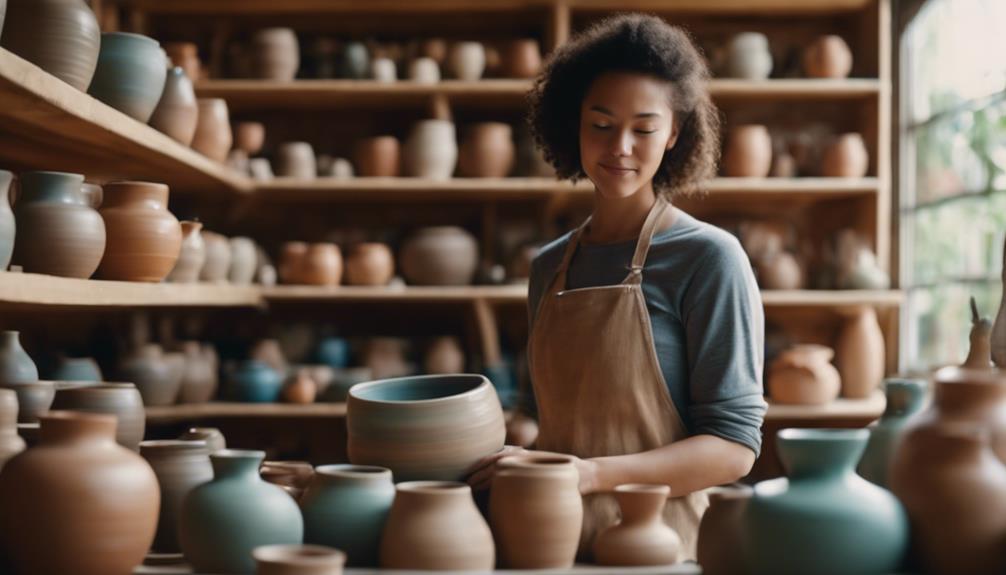
Showcasing your pottery creations effectively can significantly boost your visibility and attract potential buyers. To make the most of your marketing strategies and online presence, follow these practical tips:
- High-Quality Photos: Take high-quality photos of your pottery in natural light. This will highlight the details and craftsmanship, making your pieces more appealing to potential customers.
- Social Media: Utilise platforms like Instagram and Facebook to share your pottery. Regular posts, stories, and engaging captions can help build a loyal following and improve customer engagement.
- Local Events: Participate in local craft fairs or art exhibitions. These events offer excellent networking opportunities and allow you to connect directly with potential buyers and other artists.
- Online Portfolio: Create an online portfolio or website. A well-organised site showcasing your collection can attract buyers from beyond Shropshire, expanding your reach significantly.
- Collaborate Locally: Partner with local shops or galleries to feature your pottery. This collaboration can increase your exposure and introduce your work to a new audience.
Frequently Asked Questions
What Should I Prepare for Pottery Class?
You should prepare by checking the clothing requirements and gathering your tool checklist. Bring an apron, notebook, watercolour brushes, cutting wire, sponge, paint scraper, and masking tape. Connect with your instructor about any specific colours needed.
What to Expect at a Beginner Pottery Class?
At a beginner pottery class, you can expect a friendly environment with practical experience. The class duration usually allows plenty of time for learning and creating. Interacting with other students helps to build a sense of community, making the experience even more enjoyable.
What Pottery Technique Should a Beginner Start With?
You should start with hand building techniques, like pinch pots. It's perfect for beginners, helping you understand clay and create basic shapes. Plus, it's fun and lets you experiment, making you feel part of the pottery community.
How to Get Good at Pottery?
To improve your skills in pottery, it is important to practice consistently and experiment creatively. Working with clay regularly and trying out new techniques will help you progress. Remember, the pottery community is very supportive, so feel free to share your developments and ask for advice.
Conclusion
You've got all the tools to start your pottery journey in Shropshire. Choose the right class, gather essential materials, and immerse yourself in various techniques.
Don't forget to seek feedback from your instructor and keep practising to improve. Explore local studios and workshops for inspiration and, most importantly, enjoy showcasing your creations.
With dedication and the right guidance, you'll soon see your skills flourish. Happy potting!
